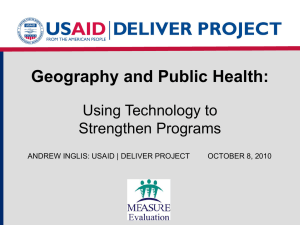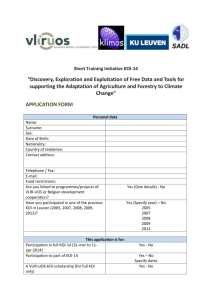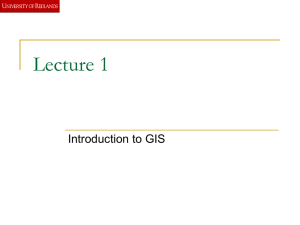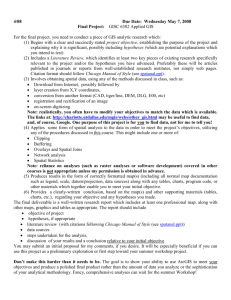GEOB370_02_GISociety
advertisement
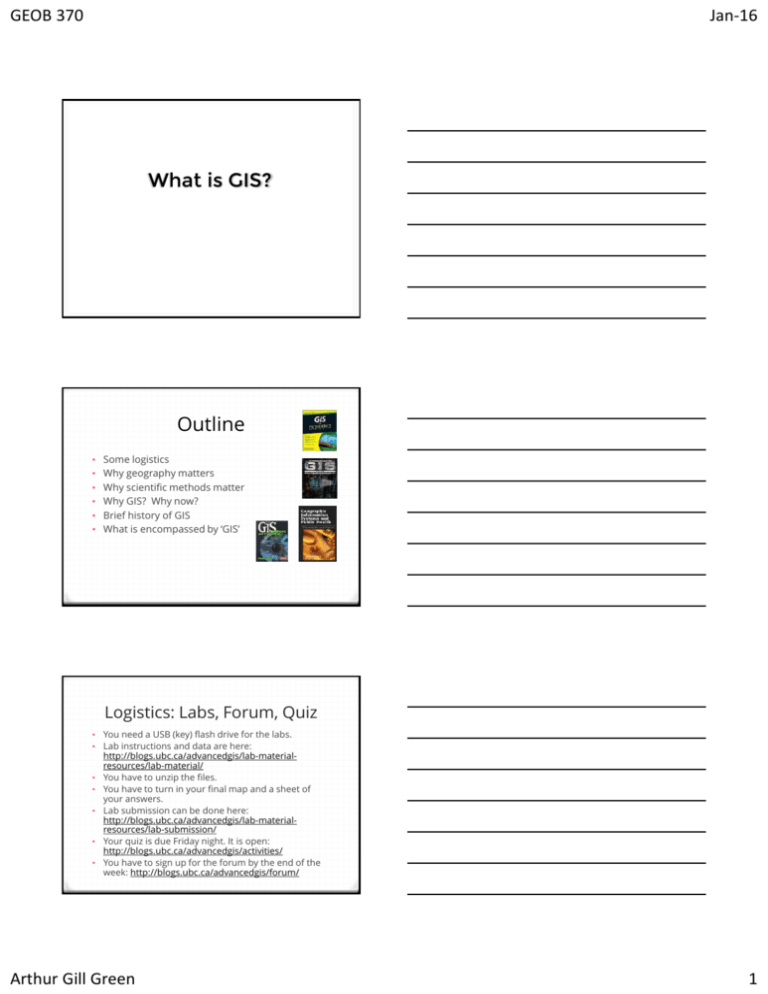
GEOB 370 Jan-16 What is GIS? Outline • Some logistics • Why geography matters • Why scientific methods matter • Why GIS? Why now? • Brief history of GIS • What is encompassed by ‘GIS’ Logistics: Labs, Forum, Quiz • You need a USB (key) flash drive for the labs. • Lab instructions and data are here: • • • • • http://blogs.ubc.ca/advancedgis/lab-materialresources/lab-material/ You have to unzip the files. You have to turn in your final map and a sheet of your answers. Lab submission can be done here: http://blogs.ubc.ca/advancedgis/lab-materialresources/lab-submission/ Your quiz is due Friday night. It is open: http://blogs.ubc.ca/advancedgis/activities/ You have to sign up for the forum by the end of the week: http://blogs.ubc.ca/advancedgis/forum/ Arthur Gill Green 1 GEOB 370 Jan-16 Geographic Information System First, let’s consider Geography… How does Geography affect our world? Arthur Gill Green 2 GEOB 370 Jan-16 Why geography matters • • • Maps generate questions Context (MAUP) Politics / economy / ecology / resource management Why geography matters Geography integrates data. Natural environment A half-mile buffer zone drawn around an existing commercial well. Land use and land cover Used to eliminate developed areas. Point sources of pollution and 500 m buffers around them. Human environment 100 m buffers around polluted streams. Areas of sand and gravel. The final map that represents the sum of the previous maps showing the areas suitable for the development of a new water well. Data integration: Locating a water well Arthur Gill Green 3 GEOB 370 Jan-16 Why scientific methods matter • Although you can achieve much by looking at things qualitatively / subjectively, it is also very important that a quantitative (scientific) approach be taken to many of today’s complex problems. • For example, in examining maps of death and disease people can (rightfully) become very concerned if they perceive a cluster of cases around the area they live in. http://www.palmbeachpost.com/news/new-data-confirms-acreage-cancer-cluster-health-officials-206471.html Chernobyl • Wind direction over the Belarus territory in April 1986. Using filtered kriging, Byelorussian districts are colored according to the probability that thyroid cancer rates in children exceeded one case per 10,000. Red represents the highest probability and cycles through the spectrum to blue, the lowest probability. • As of 2006, 5000 cases of thyroid cancer had been diagnosed. What is a GIS? Geographic Information System Examples of information systems? Arthur Gill Green Wisdom Applied Flooding Knowledge Context Richmond Information Meaning M (river ht) Data Raw 10 4 GEOB 370 Jan-16 What components make a GIS? Geographic Information System Software Hardware Data sets / databases Community of people working with geographic information and tools Activity of advanced science and problem solving Definition of GISystems A system of hardware, software data, people for collecting, sorting analyzing and disseminating information about areas of the Earth Why geography matters: GIS integrates disciplines. Software Arthur Gill Green Data Methods of analysis Visualization 5 GEOB 370 Jan-16 GIS Data • GIS data is made up of two fundamental data types: • One is graphic (like you’d find on a map) – Spatial data • One it textual (like you’d find in a table) – Attribute data • Spatial data is made up of two fundamental data types: • • One reflects a cartographic perspective One reflects a remote sensing perspective Spatial Data Attribute Data GIS data: both spatial and aspatial Spatial data: raster and vector The real world: analog realizations The digital world: discrete representations Arthur Gill Green 6 GEOB 370 Jan-16 Placing GIS in context Geographic Information System Software tools User Filter Knowledge ! Real world Geographic database Cartographic generalization Purpose / intent of producer Data models Filter ! Mandates Placing GIS in context External People Internal Spatial data and associated attributes Hardware Software If geography matters, GIS can be used to study the problem. •What areas are preferred by retirees? •Where are the important ecosystem services located? •Which areas are best suited for vineyards? Human Geography Natural Environment Population Diseases Arts Immigration Precip Soils Geology Hydrology Natural Resources Economic Activity Wetlands Mines Parks Oceans Forests Pipelines Telco Roads Industry Power Network •What is the most optimum route for the new hydro corridor? Why GIS? Why now? Arthur Gill Green 7 GEOB 370 Jan-16 GI is special Multidimensional (well example) (context) Voluminous (gigabytes of data) Requires projection to flat surface (3D -> 2D) Unique analyses methods (Spatial autocorrelation / MAUP) Analyses require data integration (well example) Keeping data current is expensive and time consuming • Map displays require fast data retrieval • • • • • • Short history: Emerging concerns • The first computer-based GIS conceived was the CGIS in the early 60’s, developed in response to the rise of environmental concerns (e.g., Silent Spring, A Sand County Almanac). Canadian Land Inventory. • The leading software vendor, ESRI, emerged from the same beginnings (Environmental Systems Research Institute). Originally it was an environmental consulting firm that felt that spatial analysis was the key to better management of our environment. Eventually the software developed by the firm ‘became’ the firm. Technological advances • • • • Computers becoming more mainstream in the late 50’s / early 60’s Database management systems developed (mission to the moon) Quantitative methods in geography Rapid advances in computer graphics Arthur Gill Green 8 GEOB 370 Jan-16 Brief History of GIS o 1960 – 70s Innovation o o o o o o First GIS – Canada Land Inventory 1969 DIME US Bureau of Census Harvard Laboratory for Computer Graphics Major vendors started (e.g., ESRI, Intergraph) Landsat satellite launched 1972 Key academic conferences (AutoCarto) Brief History of GIS • 1980-90s Commercialization • Commercial GIS software (e.g. ArcInfo) • First GIS textbooks • First global data sets (Digital Chart of the World – U.S. Defense Mapping ) Agency • Clinton Executive Order (The National Spatial Data Infrastructure) 1994 • 2000s Exploitation • Internet becomes major deliver vehicle • More than 1 million active users • GISystems • emphasis on technology and tools • GIStudies (GISociety) • Systematic study of the use of GI in society • GIScience • Fundamental issues raised by the use of geospatial technologies • • • • Spatial analysis Map projections Social impacts Data quality Arthur Gill Green 9 GEOB 370 Jan-16 Summary • Geography is important. • GIS provides a unique perspective for examining patterns and processes on the Earth’s surface (‘ologies’). • GIS is a science based on extensive technology application (science and systems). • From origins in 1960s, now a multi-billion $ industry. • Widely studied in many different disciplines. Arthur Gill Green 10

